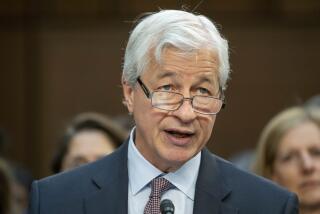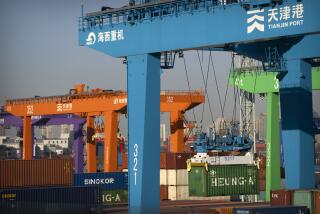European banking official’s pledge raises hope for global economy
WASHINGTON — The shaky global economy got a much-needed breather after Europe’s top central banker pledged to do “whatever it takes” to preserve the euro.
Financial markets in the U.S. were further buoyed Thursday by a pair of better-than-expected economic reports at home: The Labor Department said Thursday that initial jobless claims fell sharply last week, and the Commerce Department reported that new orders for longer-lasting manufactured goods rose at a healthy rate in June.
Neither report was as good as it appeared on the surface, but investors seemed to look past that as they took comfort in the news out of Europe.
Mario Draghi, president of the European Central Bank, hinted that banking authorities could buy more sovereign bonds. The move drove down bond yields of struggling Spain and Italy, lowering their borrowing costs, and bolstered hopes that the central bank might take more decisive action to combat the region’s long-running debt crisis.
Draghi’s remarks at a conference in London triggered a rally in Europe’s stock markets that spread to Wall Street, where stocks shot up Thursday. The Dow Jones industrial average gained 211.88 points, or 1.7%, to 12,887.93.
Still, analysts remained cautious about the economic prospects abroad and at home.
“We doubt very much it marks a watershed in the [Eurozone] crisis,” said John Higgins, a senior markets economist at Capital Economics in London. Even if the European Central Bank again starts buying such bonds, he said in a research note, “the [central] bank itself remains ideologically opposed to monetary financing of sovereign debt.”
Europe’s troubles have been a major drag on the U.S. recovery. And when the latest broad snapshot of the American economy is reported Friday, it’s not likely to be cheery.
Analysts widely expect the Commerce Department to report that U.S. gross domestic product expanded at a paltry 1.5% annual rate in the second quarter, down from 1.9% growth in the first three months of the year.
GDP growth of less than 2% is too weak to generate enough jobs to lower the nation’s high unemployment rate. GDP, the value of goods and services produced, is a widely watched measure of economic growth.
Nonetheless, brighter prospects in Europe and Thursday’s economic reports may give the Federal Reserve more reason to hold off on taking any new action to spur economic growth and hiring — at least until its September meeting, when it has more solid data in hand.
Some analysts, including those at Bank of America, see the Fed at its meeting Tuesday and Wednesday extending its pledge to keep a key short-term interest rate near zero beyond 2014 — a possible step toward another round of major bond purchases to push down long-term rates and boost economic activity.
Fed ChairmanBen S. Bernankeand his colleagues are increasingly worried about the flagging job market, which slowed sharply in the second quarter.
The latest report on new jobless claims was encouraging; filings dropped to 353,000 last week from a revised 388,000 the week before. It was the third decline in four weeks.
Yet economists said the latest drop should be taken with a pinch of salt because the data are highly volatile from week to week, especially in the summer when auto plants are shut down temporarily for retooling.
What’s more, trends in weekly jobless claims reflect layoffs, not new hiring. The main problem with the job market today is that employers, struggling with weak sales or concerned about the uncertain economic outlook, are reluctant to add workers.
Thursday’s manufacturing report on durable goods showed new orders rose 1.6% in June from May. But excluding civilian aircraft and defense-related products, a volatile category, new orders for so-called core capital goods fell 1.4% last month, underscoring a general softening of the manufacturing sector.
“The underlying details reveal fundamental weakness in business-equipment orders,” said Daniel J. Meckstroth, chief economist for the trade group Manufacturers Alliance for Productivity and Innovation.
The business-equipment sector — which includes machinery, computers and electronic products — posted declining orders in June. U.S. manufacturing and exports, which have powered the economic recovery, have slowed as Eurozone economies have slid back into recession and wary American businesses have curbed their spending.







